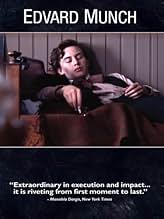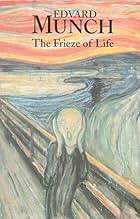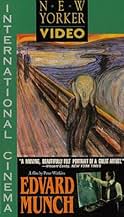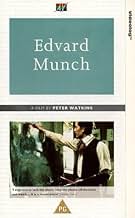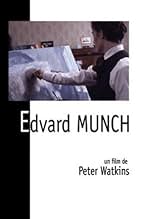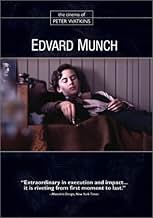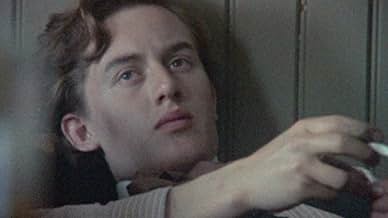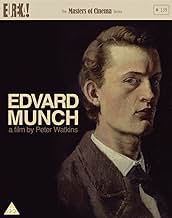अपनी भाषा में प्लॉट जोड़ेंThis biopic of Norwegian Expressionist painter Edvard Munch focuses on the influences that shaped his art, his devastating affair with a married woman that will haunt him for the rest of his... सभी पढ़ेंThis biopic of Norwegian Expressionist painter Edvard Munch focuses on the influences that shaped his art, his devastating affair with a married woman that will haunt him for the rest of his lifeThis biopic of Norwegian Expressionist painter Edvard Munch focuses on the influences that shaped his art, his devastating affair with a married woman that will haunt him for the rest of his life
- 1 BAFTA अवार्ड जीते गए
- कुल 2 जीत
- Inger Munch - 1875
- (as Anne Marie Dæhli)
फ़ीचर्ड समीक्षाएं
Rather than just detailing the chronology of the artist's life, the film tells Munch's story by juxtaposing his excruciating emotional, sexual, and spiritual conflicts against his quiet and composed public facade. Raised in a Puritan middle-class Norwegian family, Munch rebelled early on by joining a group of Bohemian artists that met nightly to discuss the strict but hypocritical rules of Norwegian society which prized marriage and purity on the one hand while allowing legalized prostitution (supervised by the local police department) on the other. Munch's mother died when he was very young and before dying, made him and his sister promise to always be good, follow Jesus, and turn away from earthly desires. The movie tries to show how his early experiences caused a lifelong tension between sexual desire, unfulfilled love, emotional trauma, and spiritual guilt that created extreme anxiety and depression that, in turn, becomes a part of Munch's art. He tries to either excise or describe his pain through his art, I'm not sure which.
The movie layers multiple sounds and sights to create the story. So, for example, when Munch has his first sexual encounter with the love of his life, who is a married woman, the scene shifts back and forth between images of him kissing his love on the neck and mouth and scenes of his mother coughing up blood and being supported by her sisters as she dies. In many scenes of the movie, when he is painting, you hear a piano playing in a bar with all the bar noises and overlaying that sound is the sound of Munch weeping after he lost his love, all the while showing him attacking the canvas violently as he paints.
As others have said, the painful story of Munch's life and art is also interlaced with information about the society he lived in and stories from the news. So throughout the movie, you hear news snippets like when Hitler was born or when a revolution breaks out in Venezuela or a story about a riot in London. There are interviews with factory workers who work 16 hour days or prostitutes who are trying to support their families. There are a lot of details about the sexual revolution of the Bohemians and the painful affairs that resulted from that. There are quite a few bar discussions about Marxism, women's rights, censorship, and art. You just can't imagine people having these kinds of discussions today. One of Munch's mentors was jailed after he wrote a book that was considered too provocative for proper society. Munch also had exhibitions shut down because they were considered improper and immoral.
I strongly recommend this movie. I'm wondering if I'll ever see anything like this again.
I had no idea how bleak Norwegian life was yet as the film postulates it is out of bleakness new ideas can flourish.
I enjoy the film most when 19th century life in the Norwegian city of Kristiania (Oslo) is described. The legalized prostitution, the walks/promenades, the puritan lifestyle.
I enjoyed it least post Munch's affair/relationship I understand Munch's obsession with his lover and I think they match it well with his desire to create art yet this I feel is also the weakest part of the film. The endless shot of him and her post relationship give the film a monotony that had me checking my watch and wondering "how long IS this film?"...
Still I feel it is worth watching as the way the film is shot has it moments when it makes you feel part of the Bohemian culture and pub life. It was like I was there, especially when the actors look into the camera.
It is also interesting to note that the actors had a huge part in creating and contributing lines to the film. A truly collaborative film...
The eponymous Munch's (played, like all here by amateur actor Geir Westby) life and career is dealt with in the usual Watkins style, focusing largely on the period between 1884 and 1894, a period in which his painting developed into what would become Expressionism. It shows a young man struggling with shyness and emotional immaturity, one that when confronted with rejection from Fru Heiberg (Gro Fraas), a married woman who has affairs with bohemian types (the film constantly reminds us of the historical realities of women in 19th century Norway, who require men to live), Munch becomes jealous and possessive. The film juxtaposes these emotional moments of anguish and the tragedies of Munch family fatalities that struck the young throughout his early life, with the development of Munch's painting style. Watkins shows throughout the actual painting process. Beginning with the breathtaking picture The Sick Child, Watkins shows the anger and psychological torment that went into it. The ways in which Munch attacked to painting with knives or the non-bristle end of the brush, which created a startlingly bleak image, devoid of unnecessary details.
Of course, as with anything different within an artistic medium, Munch's stripped down aesthetic was not met with praise initially, and Watkins shows the various vitriolic reactions from the art establishment and critics, both through over-heard conversations in gallery spaces, and the filmed interviews with detractors. During these moments, Munch can be seen skulking on the periphery, further exacerbating his deteriorating psychology, but this imbalance and possible fastidiousness influences his further subversion of the classical painting style - and one that would lead to German Expressionism. Periodically the narrator will place historical facts against the period portrayed, and the film is certainly as much about history (sometimes in relation to contemporary politics), as it is about an artist.
The bohemian group that Munch spent time with, headed by anarchist Hans Jaeger, would openly discuss political and social issues. Even women would be part of this group, and along with the formal discussion, the "film crew" interview various female exponents, discussing feminism and the role of the female within society. Placed within this historical context, the present (at least in 1974 when the film was released) was in what appeared to be a new sexual revolution, and the feminist movement was a media convention, but in 19th century Europe, these women see what they are able to achieve living within the constraints of a male dominated society. Whereas prostitution (in the '70's it was pornography) is socially seen as immoral and degrading, these female thinkers see it as motivating, a process of female empowerment. In Edvard Munch the women are self-contained, they are individual and have power over their own lives. But this is not exclusively inclusive of female characters, it is also a film (through its documentary style) that includes the audience.
Munch is the best use that I have seen of Watkins' idiosyncratic documentary style, because it is an emotional exploration, as well as a political one. The emotional aspects are embellished by the characters acknowledgement of the viewer. Throughout the film the characters look directly into the camera, addressing the audience with a glance, at times to question their own actions (should we do this?), or by including the audience in the emotional events that are occurring, you always feel included, even when those moments are incredibly voyeuristic. I at times even felt that I should not be privy to this, such was the effect of this connecting barrier. Like much of Watkins' work (and himself as a figure), Edvard Munch has been marginalised. Watkins' criticism of mass media has clearly left him out of main stream publication, and his work (whilst now gaining distribution and serious praise) is difficult to see commercially. Originally made for a Norwegian/Swedish television co-production, the film lost distribution due to the studios refusal to play it. The film did received an international release in a shortened version, but the 221 minute version is now accessible. It sounds exhausting, but the majesty and emotional connection the film presents makes it a beguiling and moving experience, and it is easily the most in depth exploration of the artistic process.
www.the-wrath-of-blog.blogspot.com
क्या आपको पता है
- ट्रिवियाThis film has a 100% rating based on 13 critic reviews on Rotten Tomatoes.
- भाव
Narrator: I felt as if there were invisible threads between us. I felt as if invisible threads from her hair still twisted themselves around me. And, when she completely disappeared there, over the ocean, then I felt still how it hurt, where my heart bled, because the threads could not be broken.
- कनेक्शनReferenced in A Discussion with Peter Watkins (1977)
टॉप पसंद
विवरण
बॉक्स ऑफ़िस
- US और कनाडा में सकल
- $43,539
- US और कनाडा में पहले सप्ताह में कुल कमाई
- $3,961
- 19 जून 2005
- दुनिया भर में सकल
- $76,949
इस पेज में योगदान दें


